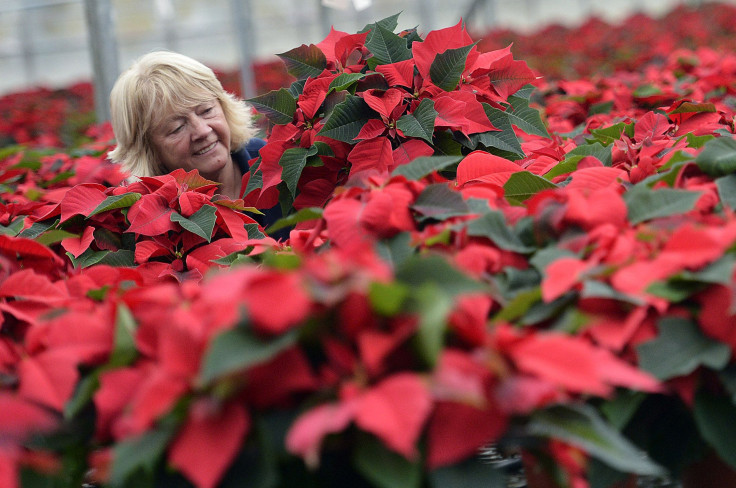National Poinsettia Day 2013: Are Poinsettias Really Poisonous To Cats, Humans? Signs Your Pet Has Been Poisoned

Happy National Poinsettia Day! Dec. 12 marks the annual celebration of the plant most commonly given and displayed during the winter holidays. The red or white leafy plant, discovered in 1828 by American botanist Joel Roberts Poinsett, has long been a staple among Christmas decorations, but it has an equally long reputation for being poisonous to pets. Are poinsettia plants really dangerous for animals and humans?
The official Poinsettia Day website asserts that the plant, known professionally by botanists as Euphorbia Pulcherrima, is not poisonous, despite myths to the contrary. But according to PetPoisonHelpLine.com, poinsettia plants are “mildly toxic to cats and dogs.” Even so, the odds of your pet actually getting poisoned by the holiday decoration are slim, says the helpline, which classified the tale as hyped and “greatly exaggerated.”
How do you know if your pet has been poisoned? According to the helpline, symptoms include vomiting, drooling and sometimes diarrhea. Experts warn that the milky sap in the plants can cause redness, swelling and itchiness among animals if exposed to their skin. A mild case of conjunctivitis, also known as pink eye, can also occur if the sap comes in contacts with animals’ eyes. Despite the range of ailments that can occur, experts say medical treatment is not indicated if any of the above symptoms occur as there is no antidote for poinsettia poisoning.
What about people? According to Michael Wahl, medical director of the Illinois Poison Center in Chicago, humans are safe from the holiday plant. “Like the Christmas myths about Santa Claus, flying reindeer and a toy workshop in the North Pole, the belief that poinsettias are poisonous is false,” Wahl told WebMD the Magazine. According to the report, the myth that poinsettias are poisonous to humans is believed to have originated in 1919 after a young girl’s parents attributed her death to eating the plant’s leaves. According to Wahl, there are no reports of deaths from eating poinsettia leaves, but he did confirm that eating the plant can cause nausea and vomiting.
While the plants may not be deadly to humans, PoinsettiaDay.com warns that people with certain sensitivities may suffer irritation from contact. “People sensitive to latex, the milky fluid found in cut poinsettias and other plants, may experience irritations in the form of a rash if they come in contact with the sap,” reads the site.
© Copyright IBTimes 2024. All rights reserved.






















